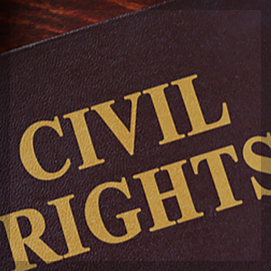
The term “civil rights” refers to the rights of citizens defined in the United States Constitution’s Bill of Rights, as well as rights that have been passed by Congress throughout the years. All individuals should become informed on what their civil rights are, how they can protect them, and what to do if their rights are violated.
A Florida civil rights attorney can help guide you through the legal proceedings of filing a case when your rights have been violated.
What Are Your Civil Rights?
The earliest civil rights that were outlined in the United States are covered in the Constitution’s Bill of Rights in the first ten amendments, and they include:
- Freedom of speech and freedom of the press to voice ideas and sentiments
- The right to peaceful protest
- Freedom to practice your religion
- The right to bear arms
- The right not to become the subject of unreasonable search and seizure, either of your body or your personal property (such as a car or home)
- Protection against double jeopardy, or being tried for the same crime more than once
- The right not to incriminate yourself in a court of law
- The right not to incur excessive bail
- The right to a speedy trial and trial by an impartial jury of your peers
- Protection from cruel and unusual punishment
Other civil rights have been developed over time. These include:
- The abolition of slavery and indentured servitude
- The end of segregation
- The right for citizens to vote, regardless of race, social class, or gender
- Protection against discrimination in the workplace regarding gender, race, religion, national origin, age, familial status and pregnancy, and disability or handicap. These are known as “protected classes”
- No public service or government organization may deny service to any protected class
- No private business may refuse service to any patron who is a member of a protected class based on the fact that they belong to that class
It’s important to note that although the federal government outlines protected classes as those belonging to a specific gender, race, religion, nation of origin, age, familial status, and disability, states have the power to broaden the scope and include more groups of people. For example, individual states have made it illegal to discriminate against a person because of their sexual orientation.
The History of Civil Rights in the State of Florida
While the United States officially became recognized as a country in 1776, Florida was not incorporated as a US state until 1845. Until that point, the Florida/Georgia line was an international border, and Florida was a Spanish colony as well as home to the Seminole Indian tribe.
Under Spanish rule, slaves had legal rights and could own property, unlike in the United States. They could buy their rights from the government and live as free men and women. Many slaves fled to what is now Florida from north of the border for this opportunity, and Florida became a melting pot of sorts.
Florida was eventually incorporated into the United States under the condition that Spanish citizens be granted US citizenship. With incorporation into the United States, individuals began to travel to Florida from states much further north, bringing slaves with them. Eventually, almost all individuals of African American descent living in what is now Florida were slaves until the end of the Civil War in 1865. At that time, Florida had to agree to end slavery, ensure all men had the right to vote, and protect everyone by the law, regardless of race, in order to remain a US state. Very shortly after, in 1868, Jonathan Clarkson Gibbs was appointed the first-ever black Secretary of State in Florida, an extremely progressive move for the time.
Activism in the State Capital of Tallahassee
The mid-20th century was a time of great civil activism in the state of Florida, with much activity taking place in the capital of Tallahassee.
In 1955, public segregation was still occurring in Florida based on race. Just as Rosa Parks had refused to give up her seat on the bus to a white passenger in Alabama, two Florida students followed suit in Tallahassee in solidarity. The police were called, and as a result, students in Tallahassee began a bus boycott. The boycott cut into the profits of bus companies within the city, and in 1957, the boycott succeeded, and the segregation ordinance was outlawed in Florida.
Recent Civil Rights Cases in the State of Florida
While civil liberties have been long-established, it’s unfortunate that individuals continue to have their rights violated to this day. The state of Florida has seen many civil rights cases throughout its history, and claims are filed every single year. The need for civil rights attorneys in Florida is prevalent, and you should never hesitate to consult with one if you feel your rights are being violated. There are laws in place to protect you.
Florida Civil Rights Lawsuits in 2019
You can view a complete list of civil rights lawsuits that have been filed in Florida this year here. There have been many. The role of civil rights lawyers is important for your rights as a human being. The most common civil rights cases that are heard in court today include:
- Discrimination in the workplace
- Violation of the American with Disabilities Act of 1990
- Discrimination lawsuits filed against law enforcement
To learn more about civil lawsuits, check out our Complete Guide to Civil Lawsuits.
When to Contact a Civil Rights Lawyer?
If your civil rights have been violated by any government body, institution, or business, you have the right to file a lawsuit against that entity.
If you aren’t sure if you have a case, contact us today for a free case evaluation. We will guide you through the legal system, standing by your side each step of the way.
